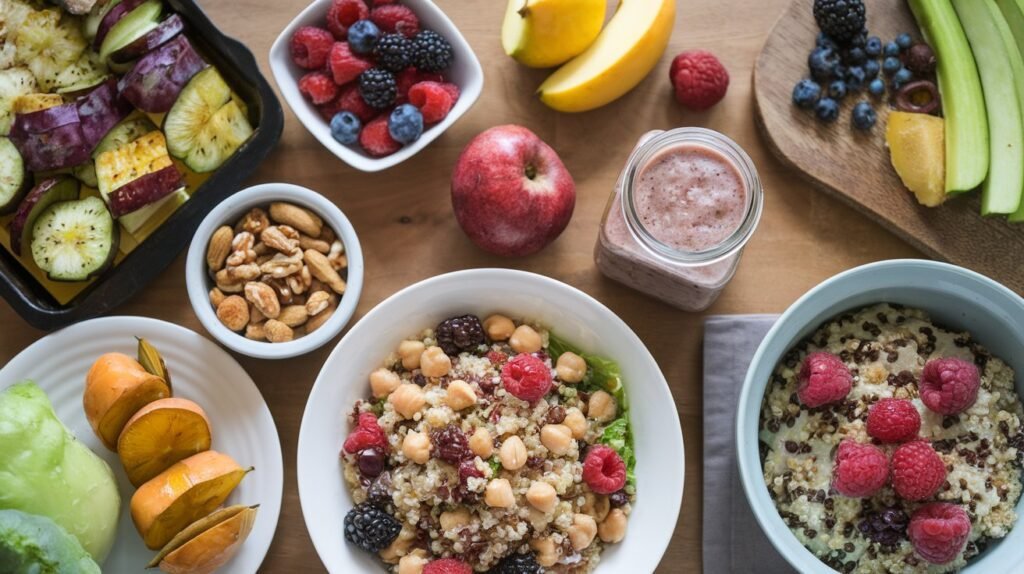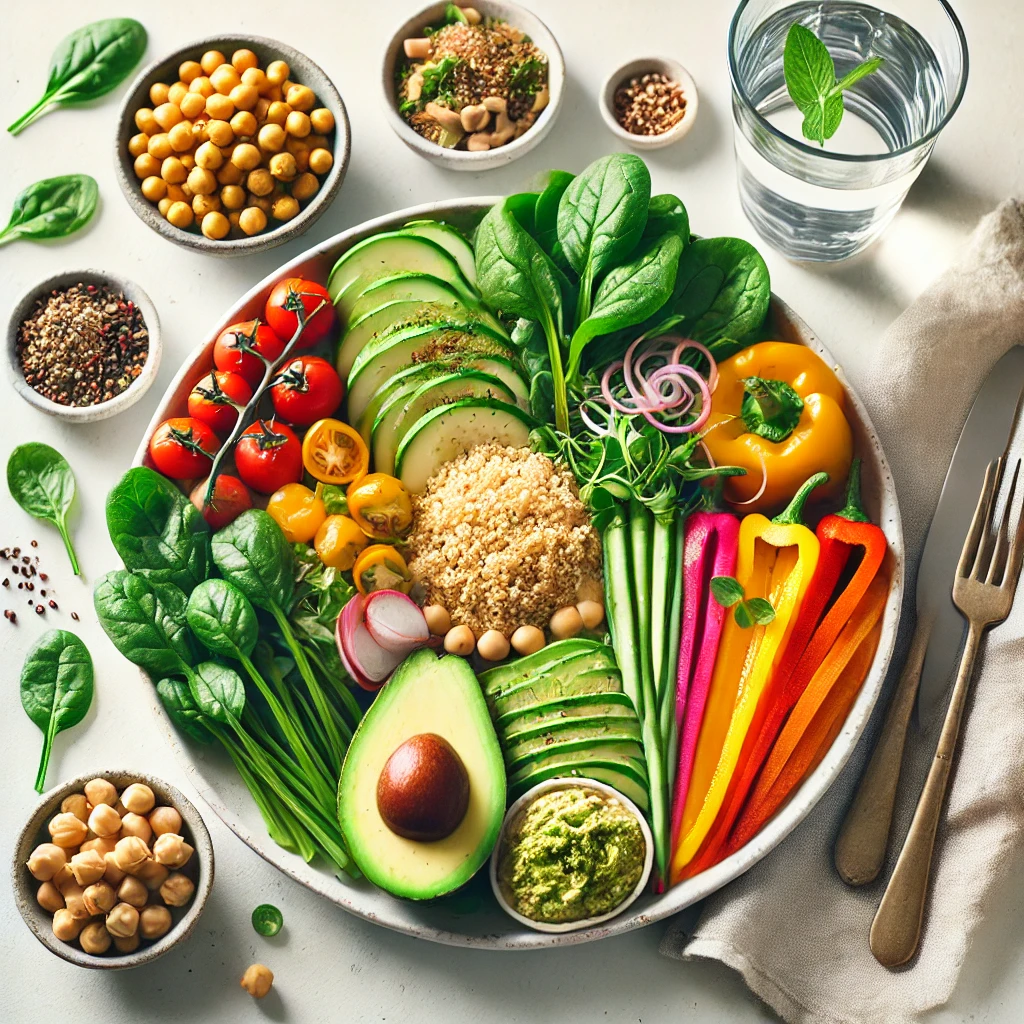In recent years, the plant-based diet for weight loss has gained significant popularity as an effective and sustainable way to shed pounds while improving overall health. This dietary approach emphasizes consuming plant foods, including fruits, vegetables, legumes, nuts, seeds, and whole grains, while minimizing or excluding animal products. A plant-based diet offers numerous benefits for individuals seeking to lose weight and improve their health, from its nutrient density to its positive environmental effects.
This article will explore the key aspects of the plant-based diet for weight loss, including its health benefits, sample meal plans, scientific evidence, and practical tips. Let’s dive into how to adopt this eating pattern to achieve your weight loss goals.
Table of Contents
Introduction to Plant-Based Diets
A plant-based diet refers to an eating pattern that prioritizes whole, minimally processed plant foods while reducing or eliminating animal products like meat, dairy, and eggs. Unlike strict veganism, a plant-based diet allows for flexibility—some followers may consume small amounts of animal products, but the primary focus is on plant foods.
| Key Elements of a Plant-Based Diet Fruits and vegetables: Rich in vitamins, minerals, and antioxidants Whole grains: Provide fiber, B vitamins, and long-lasting energy Legumes: High in protein, fiber, and essential nutrients Nuts and seeds: Sources of healthy fats and protein Minimally processed foods: Whole, unrefined plant foods are preferred |
How to Get Started on a Plant-Based Diet

Switching to a plant-based diet for weight loss can seem challenging, but with the right approach, it becomes a simple, enjoyable lifestyle change. Follow these steps to ease into a plant-based diet and maximize its benefits for your health and weight loss journey:
1. Start Slowly
Transitioning to a plant-based diet doesn’t have to happen overnight. Begin by replacing one or two meals per day with plant-based options. For example, try having a smoothie bowl for breakfast or a veggie-packed salad for lunch. Gradually increase your intake of plant-based foods as you get comfortable with new ingredients and meal options.
2. Focus on Whole Foods
Opt for whole, minimally processed plant-based foods to ensure you’re getting the most nutrients. Focus on vegetables, fruits, whole grains, legumes, nuts, and seeds. These foods are rich in fiber, vitamins, and minerals that support weight loss and overall health. For example, swap white rice for quinoa or choose sweet potatoes over processed bread.
3. Plan Your Meals
Planning your meals ahead of time is key to staying on track with a plant-based diet. Start by creating a weekly meal plan with recipes that are easy to make and suit your taste preferences. Include a balance of protein-rich legumes, high-fiber vegetables, healthy fats, and complex carbohydrates. This reduces the temptation to revert to processed or animal-based foods.
4. Get Creative with Protein Sources
One common concern about plant-based diets is getting enough protein. But plant-based proteins like lentils, chickpeas, tofu, tempeh, quinoa, and edamame are excellent and versatile options. Add beans to soups, stir-fry tofu with vegetables, or use hummus as a protein-packed dip.
5. Prepare Your Pantry
Stock your kitchen with plant-based essentials to make meal preparation easier. Keep canned beans, whole grains like oats and brown rice, nuts, seeds, and frozen vegetables on hand. This way, you’ll always have ingredients for a quick plant-based meal, even on busy days.
6. Experiment with New Recipes
A plant-based diet opens up a world of exciting recipes. Try experimenting with international cuisines that naturally feature plant-based ingredients, such as Indian curries, Mediterranean salads, or Mexican bean dishes. The more you explore, the more variety you’ll bring to your meals, making the diet sustainable and enjoyable.
7. Track Your Nutrient Intake
While a plant-based diet offers plenty of nutrients, ensure you’re getting enough protein, iron, calcium, and vitamin B12, which can sometimes be lower in plant-based diets. Consider consulting with a nutritionist to ensure your meals are balanced and meet your dietary needs.
8. Stay Hydrated
Fruits and vegetables naturally contain water, but it’s still important to stay hydrated by drinking enough water throughout the day. Proper hydration helps digestion, boosts metabolism, and supports overall well-being on your weight loss journey.
9. Join a Community
Having a support network can make the transition to a plant-based diet easier and more fun. Join online plant-based communities, social media groups, or find local cooking classes to share tips, recipes, and motivation. Engaging with others who are on a similar journey helps you stay inspired and committed.
By following these steps, you’ll set yourself up for success on a plant-based diet. Whether you’re aiming for weight loss or overall health improvement, a gradual, well-planned approach makes the transition smoother and more sustainable. Remember, the key is to enjoy the process and celebrate your progress along the way!
How the Plant-Based Diet Promotes Weight Loss
A plant-based diet is naturally aligned with weight loss due to several factors. These include the low energy density of plant foods, high fiber content, and emphasis on whole, minimally processed foods. Let’s break down how this dietary approach works to shed unwanted pounds:
1. Low Energy Density
Plant-based foods like fruits, vegetables, and legumes are generally low in calories but high in volume. This means you can eat a large amount of food while consuming fewer calories, helping to create a caloric deficit, which is crucial for weight loss.
2. High Fiber Content
Fiber is an essential component of a plant-based diet. It promotes satiety (the feeling of fullness), slows digestion, and stabilizes blood sugar levels. These factors contribute to reduced food intake and cravings, supporting sustainable weight loss.
Table 1: Fiber Content in Common Plant-Based Foods
| Food Item | Fiber Content (g per 100g) |
|---|---|
| Lentils | 7.9 g |
| Black beans | 8.7 g |
| Broccoli | 2.6 g |
| Oats | 10.1 g |
| Chia seeds | 34.4 g |
3. Plant-Based Foods Are Nutrient-Dense
Plant-based foods are rich in vitamins, minerals, and antioxidants, which are essential for maintaining optimal metabolic function. A well-functioning metabolism plays a critical role in burning calories and supporting weight loss.
4. Reduction in Processed and High-Calorie Foods
By focusing on whole, plant-based foods, you naturally minimize the intake of processed foods that are typically high in added sugars, unhealthy fats, and empty calories, all of which contribute to weight gain.
Nutrient Composition of Plant-Based Foods
Understanding the nutrient profile of plant-based foods is important for ensuring balanced nutrition while pursuing weight loss. Below are key nutrients found in plant-based diets:
- Protein: Essential for muscle repair and satiety. Found in legumes, quinoa, tofu, and tempeh.
- Healthy fats: Avocados, nuts, seeds, and olive oil provide monounsaturated fats that support cardiovascular health.
- Carbohydrates: Whole grains, fruits, and vegetables are primary sources of complex carbohydrates that offer steady energy.
Table 2: Nutritional Comparison of Common Plant-Based Proteins
| Protein Source | Protein (g per 100g) | Calories (kcal per 100g) |
|---|---|---|
| Lentils | 9.0 g | 116 kcal |
| Chickpeas | 8.9 g | 164 kcal |
| Quinoa | 4.1 g | 120 kcal |
| Tofu | 8.0 g | 76 kcal |
| Edamame | 11.9 g | 121 kcal |
Scientific Evidence Supporting Weight Loss
Several studies have shown that adopting a plant-based diet can lead to effective weight loss. A 2015 study published in Obesity Reviews found that individuals following a plant-based diet lost an average of 7.5 pounds more over 18 weeks than those on other diets . Other research highlights the role of plant-based diets in improving metabolic health markers such as blood sugar, cholesterol levels, and inflammation, all of which are critical for weight management.
Additionally, a 2020 study in Nutrients concluded that individuals who adhered to a plant-based diet for six months experienced significant reductions in body weight and body mass index (BMI) compared to those on omnivorous diets.
Sample Plant-Based Meal Plan for Weight Loss

Here’s a sample meal plan that shows how easy it can be to incorporate a plant-based diet for weight loss into your daily routine.
Day 1:
- Breakfast: Oatmeal topped with fresh berries, chia seeds, and almond butter
- Lunch: Quinoa salad with mixed greens, chickpeas, cucumber, and tahini dressing
- Dinner: Stir-fried tofu with broccoli, carrots, and brown rice
- Snack: Sliced apple with peanut butter
Day 2:
- Breakfast: Green smoothie with spinach, banana, flaxseeds, and almond milk
- Lunch: Lentil soup with a side of whole-grain bread
- Dinner: Sweet potato stuffed with black beans, salsa, and avocado
- Snack: Carrot sticks with hummus
This type of meal plan is rich in fiber, protein, and healthy fats, providing sustained energy while promoting caloric control.
Benefits Beyond Weight Loss
In addition to weight loss, adopting a plant-based diet offers numerous other health benefits:
Improved Heart Health
Plant-based diets are associated with reduced risk factors for cardiovascular diseases, including lower levels of LDL (bad) cholesterol and improved blood pressure control .
Enhanced Digestion
The high fiber content in plant-based foods promotes regular bowel movements and supports gut health by feeding beneficial gut bacteria.
Lower Risk of Chronic Diseases
A plant-based diet has been linked to a reduced risk of developing type 2 diabetes, certain cancers, and neurodegenerative diseases .
Practical Tips for Success on a Plant-Based Diet
- Start Slowly: Gradually increase the number of plant-based meals in your week.
- Plan Ahead: Prepare your meals in advance to avoid reliance on processed options.
- Experiment with New Foods: Try new vegetables, legumes, and grains to keep your meals exciting.
- Stay Balanced: Ensure you’re getting enough protein and healthy fats to stay full and energized.

Common Myths and Misconceptions
Myth 1: Plant-Based Diets Lack Protein
Truth: A well-balanced plant-based diet provides adequate protein from legumes, tofu, tempeh, and quinoa.
Myth 2: Plant-Based Diets Are Expensive
Truth: Staples like rice, beans, lentils, and seasonal produce are often cheaper than meat and processed foods.
Conclusion
A plant-based diet for weight loss is not only effective but also offers a wide range of additional health benefits. By focusing on whole, minimally processed foods rich in fiber and nutrients, you can achieve your weight loss goals while improving overall wellness. With scientific backing, practical meal plans, and a focus on sustainability, the plant-based diet is an excellent choice for those looking to lose weight in a healthy and sustainable way.
References
- Satija, A., Bhupathiraju, S. N., Rimm, E. B., Spiegelman, D., Chiuve, S. E., Borgi, L., & Hu, F. B. (2016). Plant-based diets and the risk of type 2 diabetes in US adults. PLOS Medicine, 13(6), e1002039.
- Barnard, N. D., Levin, S. M., & Yokoyama, Y. (2015). A systematic review and meta-analysis of changes in body weight in clinical trials of vegetarian diets. Obesity Reviews, 16(6), 465-478.
- Wang, F., Zheng, J., Yang, B., Jiang, J., Fu, Y., & Li, D. (2015). Effects of vegetarian diets on blood lipids: A systematic review and meta-analysis of randomized controlled trials. Journal of the American Heart Association, 4(10), e002408.
- Tonstad, S., Stewart, K., Oda, K., Batech, M., Herring, R. P., & Fraser, G. E. (2013). Vegetarian diets and incidence of diabetes in the Adventist Health Study-2. Nutrition, Metabolism and Cardiovascular Diseases, 23(4), 292-299.




